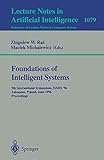Foundations of Intelligent Systems [electronic resource] : 9th International Symposium, ISMIS '96 Zakopane, Poland, June 9–13, 1996 Proceedings / edited by Zbigniew W. Raś, Maciek Michalewicz.
Material type: TextSeries: Lecture Notes in Computer Science, Lecture Notes in Artificial Intelligence ; 1079Publisher: Berlin, Heidelberg : Springer Berlin Heidelberg, 1996Description: XI, 668 p. online resourceContent type: text Media type: computer Carrier type: online resourceISBN: 9783540684404Subject(s): Computer science | Information systems | Artificial intelligence | Computer Science | Artificial Intelligence (incl. Robotics) | Mathematical Logic and Formal Languages | Information Systems Applications (incl.Internet) | Computation by Abstract DevicesAdditional physical formats: Printed edition:: No titleDDC classification: 006.3 LOC classification: Q334-342TJ210.2-211.495Online resources: Click here to access online
TextSeries: Lecture Notes in Computer Science, Lecture Notes in Artificial Intelligence ; 1079Publisher: Berlin, Heidelberg : Springer Berlin Heidelberg, 1996Description: XI, 668 p. online resourceContent type: text Media type: computer Carrier type: online resourceISBN: 9783540684404Subject(s): Computer science | Information systems | Artificial intelligence | Computer Science | Artificial Intelligence (incl. Robotics) | Mathematical Logic and Formal Languages | Information Systems Applications (incl.Internet) | Computation by Abstract DevicesAdditional physical formats: Printed edition:: No titleDDC classification: 006.3 LOC classification: Q334-342TJ210.2-211.495Online resources: Click here to access online  E-BOOKS
E-BOOKS
| Current library | Home library | Call number | Materials specified | URL | Status | Date due | Barcode |
|---|---|---|---|---|---|---|---|
| IMSc Library | IMSc Library | Link to resource | Available | EBK6991 |
Putting objects to work on a massive scale -- Approximate and commonsense reasoning: From theory to practice -- Cooperative information systems engineering -- Towards a Worldwide Knowledge base extended abstract -- Data mining and knowledge discovery in business databases -- Learning composite concepts in description logics: A first step -- Comparison of conceptual graphs for modelling knowledge of multiple experts -- Semantical considerations for knowledge base updates -- Partial evaluation in Constraint Logic Programming -- The AQ17-DCI system for data-driven constructive induction and its application to the analysis of world economics -- Induction of classification rules from imperfect data -- Induction of expert system rules from databases based on rough set theory and Resampling methods -- Mining patterns at each scale in massive data -- On evolving intelligence -- Intelligent mutation rate control in canonical genetic algorithms -- A fine-grained parallel evolutionary program for concept induction -- Evolutionary exploration of search spaces -- Evolutionary computation: One project, many directions -- Signed formula logic programming: Operational semantics and applications (extended abstract) -- Automating proofs of integrity constraints in situation calculus -- Towards programming in default logic -- A sound and complete fuzzy logic system using Zadeh's implication operator -- Meeting the deadline: On the formal specification of temporal deontic constraints -- Validity queries and completeness queries -- Explanation for Cooperative Information Systems -- Toward intelligent representation of database content -- Reducing information systems with uncertain attributes -- Object and dependency oriented programming in FLO -- Knowledge simplification -- A model-based approach to consistency-checking -- Resource-based vs. task-based approaches for scheduling problems -- A Fuzzy Behaviorist Approach to sensor-based robot control -- Knowledge-based fuzzy neural networks -- Coevolutionary game theoretic multi-agent systems -- Searching for features defined by hyperplanes -- Inductive database design -- Enhancing query processing of information systems -- Structuring and retrieval of the complex predicate arguments proper to the NKRL conceptual language -- On the handling of imperfect data in relational database systems from null values to possibility distributions -- Modified component valuations in Valuation Based systems as a way to optimize query processing -- Learning for decision making: The FRD approach and a comparative study -- The application of rough sets-based data mining technique to differential diagnosis of meningoenchepahlitis -- A rough set framework for data mining of prepositional default rules -- An empirical study on the incompetence of attribute selection criteria -- Locally finite, proper and complete operators for refining Datalog programs -- Forest fire management with Negoplan -- An architecture for a deductive Fuzzy Relational Database -- A multi-step process for discovering, managing and refining strong functional relations hidden in databases -- An architecture and methodology for the design and development of Technical Information Systems -- Explaining explanation closure -- PAC-learning logic programs under the closed-world assumption -- Planning, truth criteria and the systematic approach to action and change -- Automated inductive reasoning as a support of deductive reasoning in a user-independent automation of inductive theorem proving -- Semantic query optimization for bottom-up evaluation -- Dynamically changing behavior: An agent-oriented view to modeling intelligent information systems -- A multi-layer architecture for knowledge-based system synthesis -- MuRaLi: An architecture for multiple reasoning -- Heterogeneous view integration via sketches and equations -- DLAB: A declarative language bias formalism -- Knowledge discovery in databases and data mining -- Learning with noise in engineering domains -- Hierarchical conceptual clustering in a first order representation -- Rule discovery from databases with decision matrices.
This book constitutes the refereed proceedings of the 9th International Symposium on Methodologies for Intelligent Systems, ISMIS '96, held in Zakopane, Poland, in June 1996. The 53 revised full papers presented were selected from a total of 124 submissions; also included are 10 invited papers by leading experts surveying the state of the art in the area. The volume covers the following areas: approximate reasoning, evolutionary computation, intelligent information systems, knowledge representation and integration, learning and knowledge discovery, and AI logics.


There are no comments on this title.